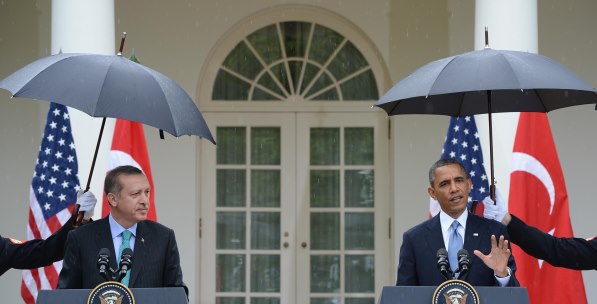I spent the past week in Washington, D.C., where I traveled to participate in the fourth annual conference of Insight Turkey, a leading quarterly journal on Turkish politics and international affairs. I had the opportunity to meet with officials from the White House, the State Department and the Pentagon as well as various NGOs, think tanks and media outlets. Our discussions revolved around two topics: Turkish-American relations and American perceptions of Turkey.
Interestingly enough, the former topic tended to reaffirm a sense of harmony following decades of cooperation, while the latter was often dominated by a negative view of Prime Minister Recep Tayyip Erdoğan and his AK Party. In this sense, U.S. perceptions of Turkey tend to reflect – naturally, of course – subjective assessments.
In contrast, analyses on Turkish-American relations keep an eye on concrete policies – which results in a highly visible discrepancy between the two views. Critics thus concentrate on the AK Party’s domestic positions including what they interpret as restrictions on press freedom, interventions in judicial independence and anti-U.S. comments which surface along with anti-government protests.
U.S. officials’ critique of Turkey, however, reflects an overall lack of in-depth understanding of the country and, as such, seems to adopt a version of its affairs according to opposition groups. As Turkey saw its status in a recently published report by Freedom House decline from Partly Free to Not Free, press freedom came up during our conversations more frequently than in previous years. To be fair, the report failed to present competing perspectives on the issue and made no mention of the press as a heavily politicized instrument of power struggles and the variety of patronage-clientage relations that preside over this domain.
In truth, the first issue that we should take into consideration when dealing with press freedom in Turkey is that the past decade has witnessed an intense power struggle between large chunks of society which fought over challenges to the official ideology, the polical center and the regime. Approximately 40 national media outlets actively participate in this struggle by presenting their views to their readership. As such, one finds literally no outlet that prioritizes its duty of reporting the news over the broader political struggle: While roughly a quarter of all media outlets side with the ruling AK Party, the rest criticize the government from the standpoint of their particular political movements and religious communities. To be sure, the politicization of media outlets tend to undermine their objectivity and professional values. After all, the readers prefer certain newspapers over others in order to hear stories relevant to their political camp and reproduce their take on national politics – a phenomenon that leaves newspapers and columnists increasingly more vulnerable to pressures from their readership. As such, it would not be inaccurate to claim that editors and columnists today encounter the greatest pressures from likeminded people. Discussions about the media and press freedoms in Turkey largely ignore the abovementioned facts about the state of news outlets and instead reflect a narrow-minded approach toward the AK Party and the prime minister. The question, then, remains whether such shallow interpretations stem from a lack of information or a deliberate choice about the country.
[Daily Sabah, May 5, 2014]



